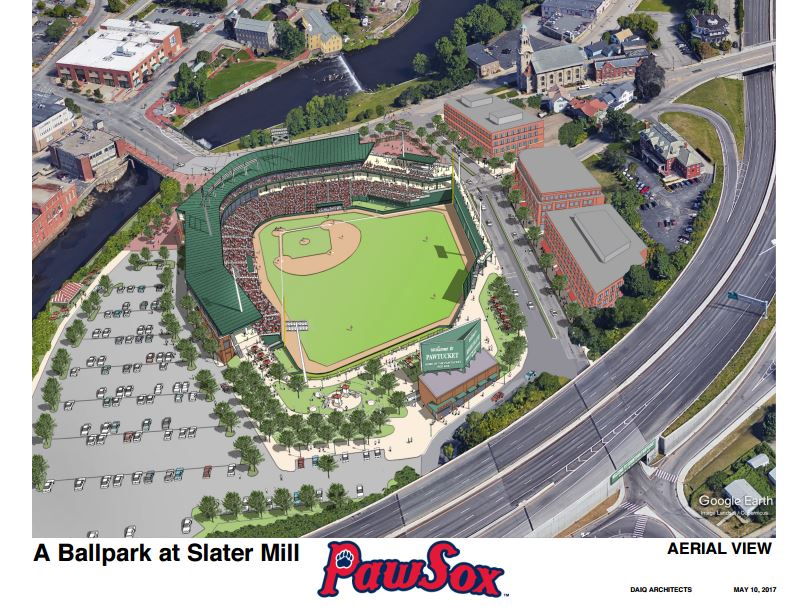
PAWTUCKET – The Pawtucket Red Sox ownership group on Tuesday announced a plan to build a new baseball stadium at the Apex in Pawtucket, and is asking city and state taxpayers to help pay for the $83 million price tag.
The Pawtucket Red Sox, or Pawsox, announced the new Triple-A stadium, dubbed “Ballpark at Slater Mill,” together with Pawtucket Mayor Donald R. Grebien. The announcement was made nearby the Apex land at Slater Mill.
Grebien, team owners and R.I. Commerce Corp. representatives, who have been working on a deal for several months, now say they’re ready to bring a financing proposal to state leadership for consideration.
“We have all reached agreement on the proposal to present,” Grebien said. “It is time to widen the circle and bring this proposal to the governor and state legislature for their consideration and approvals.”
To build the new stadium – which would open in 2020 – would cost an estimated $73 million. The Apex property would cost an additional $10 million, bringing total costs to about $83 million.
The ownership group is offering to pay $45 million – or 54.2 percent – of total costs, and is asking for state and city taxpayers to pay for the rest. State taxpayers would pay about $23 million. Pawtucket taxpayers would pay an additional $15 million.
The stadium and land would become public property, and the team would then sign a 30-year lease extension to play ball at the stadium through 2050. The Pawsox would pay $1 million each year beginning in 2020, which the team says is the most any minor league team pays in the country.
The ownership group would also devote $500,000 annually from naming rights to help finance the new ballpark, according to the proposal.
The proposal was quickly rejected by the state’s Republican Party Chairman, Brandon S. Bell, who called it a bad idea, especially since the state’s budget office calculates revenue will fall short about $100 million over the next two fiscal years.
“This proposal is simply a bad idea. Rhode Island taxpayers cannot afford to subsidize a new ballpark,” he said in a statement. “[House] Speaker Nicholas Mattiello is back tracking on his campaign promise to eliminate the car tax by saying he needs six years instead of five years to eliminate it. Governor Gina Raimondo is talking about the possibility of cuts to social services to balance the budget. Does Mattiello and Raimondo really want to explain to the voters how they postponed car tax relief and pushed for cuts to social services while giving millionaires $38 million to build a new ballpark?”
The state’s investment would be repaid by tax revenue generated at the ballpark, which closely mirrors a Raimondo-created economic-development tool called “tax increment financing,” or TIF, which is overseen by Commerce.
A Commerce spokesman could not immediately confirm the team would seek incentives through the TIF program, but the financing tool is designed to provide developers with gap financing rebated by new state tax revenue generated from the qualifying project.
The rebate cannot exceed 30 percent of total project costs, and the state’s $23 million contribution toward the new stadium and land would total 27.7 percent of total costs.
Raimondo on Tuesday told reporters she could support a new stadium if it cost less than fixing McCoy Stadium, the Pawtucket stadium where the Pawsox have played home games for decades. The deal would also have to be revenue neutral, she said, meaning the state would have to recoup the full amount it spent in subsidies.
“I want to see something that basically pays for itself, is revenue neutral and is less than what the state would already have to pay to patch up McCoy,” she said.
After the team and city announced the new plan, Raimondo released a statement lauding the deal, but saying her highest priority is “to protect Rhode Island’s taxpayers.
“The ballpark proposal that the City of Pawtucket and the team has put forward appears to pay for itself, and I credit Mayor Grebien and the Pawsox for listening to Rhode Islanders and coming up with a radically different proposal than two years ago,” she said.
A previous effort by the ownership group to move to a new stadium in Providence two years ago was thwarted after public outcry against providing public subsidies for such a project.
“I believe it merits a full public vetting as part of the legislative process,” Raimondo added.
The ownership group says its $45 million contribution would mark the largest private investment made in Pawtucket history. The team would also pay for any overrun costs, and local owners have agreed to donate annual dividends over the next five years to three Rhode Island charities: the Pawtucket Foundation, the Rhode Island Foundation and the Pawsox Foundaiton.
Larry Lucchino, Pawsox chairman, also says the ballpark could be used for other purposes and will attract more development projects to the city.
“It will be a city park, open year-round,” he said. “It could have football in the autumn, hockey in the winter, concerts in the summer and joggers every day when the team is out of town.”
The ownership group has also made an ally out of Grebien, which could help its cause.
“It is a special opportunity in time we don’t want to miss,” Grebien said.
Eli Sherman is a PBN staff writer. Email him at Sherman@PBN.com, or follow him on Twitter @Eli_Sherman.












